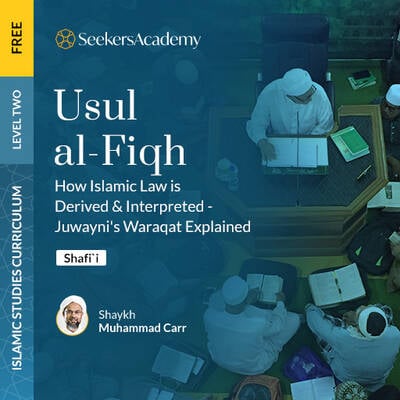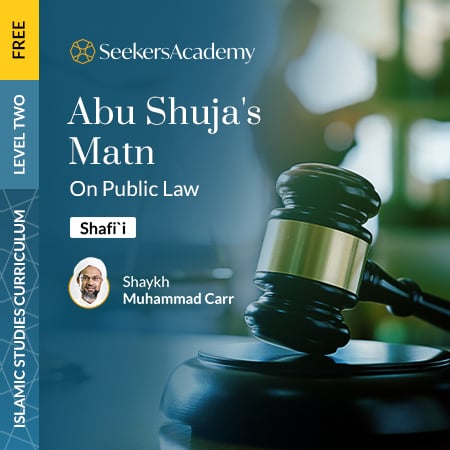
This thought-provoking and insightful intermediate (Level Two) course in Islamic Legal Theory is for anyone seeking to gain an appreciation of how Islamic Law works.
Imam Juwayni, author of the Waraqat was an imam (i.e., someone who is taken as an exemplar) of the Islamic sciences in the fullest sense of the word: he authored multi-volume seminal works in Shafi‘i jurisprudence, Islamic theology, and Islamic legal theory.
The main benefit of this course is to illustrate how Islamic law is derived from its sources and equip you with the tools required to extrapolate law from the Qur’an and sunna.
The course sets a foundation and framework for further studies in Usul (Islamic legal Theory) .
By taking this course, students will be able to locate traditional fiqh within the Qur’an and sunna and also deal with differences in society in a more cohesive manner.
- Teacher: Shaykh Muhammad Carr
The Waraqat, a primer on Islamic legal theory (Usul al-fiqh) by Imam Juwayni (d. 478 A.H. / 1085 C.E.), is an important text that covers the integrals of Islamic legal theory namely: sources of Islamic Law, types of speech, modes of extrapolation, and the condition of the extrapolator in terms of being an original thinker or otherwise.
The text is significant due to the author and the prominence that Allah has afforded it. Imam Juwayni was an imam (i.e., someone who is taken as an exemplar) of the Islamic sciences in the fullest sense of the word. His Waraqat is a short work that brings his vast scholarship in the science of Islamic legal theory down to the level of an absolute beginner. Ever since it was written almost a thousand years ago, students of the Shafi‘i, Maliki, and Hanbali schools have successfully used it to begin their study of Islamic legal theory.
The Waraqat is taught in light of the renowned sharh (explanatory notes) provided by Jalal al-din al-Mahalli. The more extensive sharh by Ibn al-Firkah was also consulted as part of the preparation for this course.
- This course is for students of the Islamic sciences. It is particularly beneficial for students wanting to gain a deeper understanding and appreciation of Islamic Law
- It is a level 2 course and a student must have finished all the level one courses.
- This course can also be taken by anyone who is interested in learning more about how Islamic Law works and those wishing to pave a career in fiqh.
- Explain what Islamic legal theory is and why it needs to be studied
- Learn how to interpret the Qur’an and Sunna
- Memorize the definitions of key terms in the science of Islamic legal theory
- Appreciate the depth of scholarship of Islamic jurisprudence
- Apply the techniques of Islamic legal theory to gain clarity on contemporary religious debates about literalism, ijtihad and taqlid.


